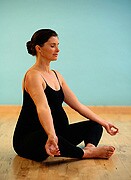
SUNDAY, May 23 (HealthDay News) — Yoga is safe for pregnant women, as long as they approach the activity with reasonable caution and moderation, experts say.
“Women who are expecting can benefit greatly from exercise, especially yoga — they just need to be aware of their limitations,” orthopaedic surgeon and mom-to-be Dr. Rachel Rohde said in a news release issued by the American Academy of Orthopaedic Surgeons (AAOS).
“A pregnant woman’s body goes through a lot of changes that will alter the way she practices yoga, whether she is a veteran or a beginner,” Rohde added.
As a fitness alternative, yoga allows pregnant women to maintain an exercise program without harming their baby or their heart, according to the AAOS and, overall, the benefits of such a low-impact regimen outweigh the risks.
However, maintaining correct yoga positioning is critical to ensuring general safety and avoiding muscle or joint injury, the organization pointed out. The U.S. Consumer Product Safety Commission noted that more than 5,500 Americans were treated for yoga-related injuries in 2008.
Nevertheless, the AAOS says that if performed properly, yoga affords expectant mothers a good opportunity to build strength and flexibility, while achieving a measure of relaxation and breath control.
“One of the best aspects of yoga is being in control of your body and having the ability to do each movement at your own pace,” said Rodhe. “Poses like ‘downward dog’ that require a lot of pressure on the palm can increase carpal tunnel symptoms by pressing on a major nerve; if you get numbness in your fingers while in one of these positions, move so that the weight is not resting on your hands. If you are unable to move into a difficult position, you always have the option to get into a resting pose if experiencing pain.”
The AAOS recommends that those interested in practicing yoga should consult their physician first and make sure they work with a qualified instructor. Proper warm-ups and attire are important as well, and pregnant women should take care to remain properly hydrated and avoid forms of yoga such as Bikram — also called “hot” yoga — that can unduly raise their body temperature.
More information
For more on yoga, visit the U.S. National Center for Complementary and Alternative Medicine.

